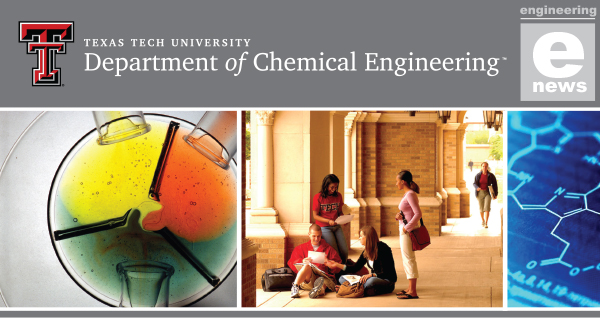
Faculty News
 Kudos to Dr. Jeremy Marston on winning the prestigious CAREER Award from the National
Science Foundation to support research investigating the fluid dynamics of needle-free
injection. The work focuses on fundamental aspects of drug delivery using high-speed
liquid jets which puncture the skin and deposit drug in the intradermal layers. The
award provides $ 503,000 funding for five years and extends work previously funded
by Inovio Pharmaceuticals. Both graduate and undergraduate researchers will participate
and use high-speed video imaging to assess the dynamics. In addition to his research,
Dr. Marston, who is an Assistant Professor in the department, also excels in the classroom,
and he received the Whitacre College of Engineering Lockheed-Martin Teaching Award
for excellence in undergraduate and graduate teaching in 2017.
Kudos to Dr. Jeremy Marston on winning the prestigious CAREER Award from the National
Science Foundation to support research investigating the fluid dynamics of needle-free
injection. The work focuses on fundamental aspects of drug delivery using high-speed
liquid jets which puncture the skin and deposit drug in the intradermal layers. The
award provides $ 503,000 funding for five years and extends work previously funded
by Inovio Pharmaceuticals. Both graduate and undergraduate researchers will participate
and use high-speed video imaging to assess the dynamics. In addition to his research,
Dr. Marston, who is an Assistant Professor in the department, also excels in the classroom,
and he received the Whitacre College of Engineering Lockheed-Martin Teaching Award
for excellence in undergraduate and graduate teaching in 2017.
 Dr. Sheima Khatib performs catalysis research to upgrade methane directly into benzene
and hydrogen using a mixed Mo‐C‐Fe catalyst supported on a ZSM‐5 structure. Her group
has discovered that adding small quantities of iron oxide to the molybdenum oxide
catalyst enhances the yield to benzene. In addition, both benzene yield and catalytic
stability are enhanced by precarburization of the catalysts to form modified molybdenum
carbide species before reaction. Dr. Khatib presented the results at the Catalysis
Gordon Research Conference where she received an Outstanding Poster Presentation Award
for the work. She also recently received a $ 450,000 grant from the Department of
Energy for this project. In addition to performing innovative research, Dr. Khatib,
an Assistant Professor in the department, is interested in teaching pedagogy and has
been recognized by multiple teaching awards, including the 2017 Whitacre College of
Engineering George T. and Gladys Abell-Hanger Faculty Award, the 2017 TLPDC Faculty
Spotlight Award for enhancing student learning and engagement in the classroom, and
Best Professor from the AIChE Student Chapter in both 2017 and 2018.
Dr. Sheima Khatib performs catalysis research to upgrade methane directly into benzene
and hydrogen using a mixed Mo‐C‐Fe catalyst supported on a ZSM‐5 structure. Her group
has discovered that adding small quantities of iron oxide to the molybdenum oxide
catalyst enhances the yield to benzene. In addition, both benzene yield and catalytic
stability are enhanced by precarburization of the catalysts to form modified molybdenum
carbide species before reaction. Dr. Khatib presented the results at the Catalysis
Gordon Research Conference where she received an Outstanding Poster Presentation Award
for the work. She also recently received a $ 450,000 grant from the Department of
Energy for this project. In addition to performing innovative research, Dr. Khatib,
an Assistant Professor in the department, is interested in teaching pedagogy and has
been recognized by multiple teaching awards, including the 2017 Whitacre College of
Engineering George T. and Gladys Abell-Hanger Faculty Award, the 2017 TLPDC Faculty
Spotlight Award for enhancing student learning and engagement in the classroom, and
Best Professor from the AIChE Student Chapter in both 2017 and 2018.
 Dr. Siva Vanapalli was awarded a President's Excellence in Research Professorship
at the Faculty Honors Convocation in April. Dr. Vanapalli is the first cohort of faculty
winning this award which carries a minimum of $ 5000 in discretionary research funding
for three years. Dr. Vanapalli is a leader in the field of microfluidics, including
using techniques developed in his laboratory for cancer screening. He also has a exciting
new research thrust area investigating aging and muscle loss using C. elegans as a
model system. Dr. Vanapalli has been associated with over thirty awarded grants, totaling
over $ 7 M, since his arrival at TTU ten years ago, and he has published over fifty
publications and has accrued a considerable number of honors. Most recently, Dr. Vanapalli
and his previous student, Mizanur Rahman, won an Innovation Award at the Tech Connect
Conference in Anaheim, CA, for their microfluidic technology used to study aging.
Dr. Siva Vanapalli was awarded a President's Excellence in Research Professorship
at the Faculty Honors Convocation in April. Dr. Vanapalli is the first cohort of faculty
winning this award which carries a minimum of $ 5000 in discretionary research funding
for three years. Dr. Vanapalli is a leader in the field of microfluidics, including
using techniques developed in his laboratory for cancer screening. He also has a exciting
new research thrust area investigating aging and muscle loss using C. elegans as a
model system. Dr. Vanapalli has been associated with over thirty awarded grants, totaling
over $ 7 M, since his arrival at TTU ten years ago, and he has published over fifty
publications and has accrued a considerable number of honors. Most recently, Dr. Vanapalli
and his previous student, Mizanur Rahman, won an Innovation Award at the Tech Connect
Conference in Anaheim, CA, for their microfluidic technology used to study aging.
 Dr. Gregory McKenna received Fellowship in the American Association for the Advancement
of Science (AAAS). Prof. McKenna was recognized for his work on phase transitions
at the nanoscale and nonlinear mechanical properties. He pioneered efforts to understand
the glass transition under nanoscale nanoconfinement, when he and then postdoc Cathy
Jackson wrote the first paper detailing the decrease in Tg for glass-formers confined
to nanopores in 1990. In more recent work from Texas Tech, he has the current "record"
of a Tg depression of nearly 122 K for ultrathin polycarbonate films of 3 nm thickness.
Understanding how properties change with decreasing size scale is important for implementation
of nanotechnology.
Dr. Gregory McKenna received Fellowship in the American Association for the Advancement
of Science (AAAS). Prof. McKenna was recognized for his work on phase transitions
at the nanoscale and nonlinear mechanical properties. He pioneered efforts to understand
the glass transition under nanoscale nanoconfinement, when he and then postdoc Cathy
Jackson wrote the first paper detailing the decrease in Tg for glass-formers confined
to nanopores in 1990. In more recent work from Texas Tech, he has the current "record"
of a Tg depression of nearly 122 K for ultrathin polycarbonate films of 3 nm thickness.
Understanding how properties change with decreasing size scale is important for implementation
of nanotechnology.
 Assistant Professor Dr. Ya-Wen Chang recently received her first research grant for
a project funded by $ 100,000 from the American Chemical Society Petroleum Research
Fund. The research focuses on using phase transfer catalyst-modified nanosheets as
emulsifiers, with a goal of establishing the connection between particle properties
and emulsion stability through characterization of bulk emulsion and mesoscale droplet
behavior. The work will provide the principles for constructing effective emulsification/de-emulsification
strategies for enhanced oil recovery. Dr. Chang, who started her tenure-track position
at Texas Tech in 2017, teaches Chemical Reaction Engineering and an elective on soft
matter.
Assistant Professor Dr. Ya-Wen Chang recently received her first research grant for
a project funded by $ 100,000 from the American Chemical Society Petroleum Research
Fund. The research focuses on using phase transfer catalyst-modified nanosheets as
emulsifiers, with a goal of establishing the connection between particle properties
and emulsion stability through characterization of bulk emulsion and mesoscale droplet
behavior. The work will provide the principles for constructing effective emulsification/de-emulsification
strategies for enhanced oil recovery. Dr. Chang, who started her tenure-track position
at Texas Tech in 2017, teaches Chemical Reaction Engineering and an elective on soft
matter.
 A hearty welcome to Drs. Mahdi Malmali and Joshua Howe. Both joined the Chemical Engineering
faculty as Assistant Professors, with Dr. Malmali joining last January and Dr. Howe
joining this fall. Dr. Malmali, a chemical engineer by training, received his B.S.
from Razi University in Iran and his Ph.D. from the University of Arkansas, and then
he performed a postdoc at the University of Minnesota. He is an experimentalist interested
in membrane-based separations, process intensification, thermochemical energy storage,
and water recycle. Dr. Malmali co-taught design in spring 2018 and he will teach a
transport elective this fall.
A hearty welcome to Drs. Mahdi Malmali and Joshua Howe. Both joined the Chemical Engineering
faculty as Assistant Professors, with Dr. Malmali joining last January and Dr. Howe
joining this fall. Dr. Malmali, a chemical engineer by training, received his B.S.
from Razi University in Iran and his Ph.D. from the University of Arkansas, and then
he performed a postdoc at the University of Minnesota. He is an experimentalist interested
in membrane-based separations, process intensification, thermochemical energy storage,
and water recycle. Dr. Malmali co-taught design in spring 2018 and he will teach a
transport elective this fall.
 Dr. Howe comes to Texas Tech after a postdoc at Georgia Tech. His Ph.D. is in chemical
engineering from Berkeley, and his undergraduate degrees are in chemical engineering
and physics from Penn State. Dr. Howe's research interests lie in understanding nanoporous
materials used in adsorption, separation, and sensing applications. He plans to perform
molecular simulations to address challenges associated with metal-organic frameworks
(MOFs), a particularly promising class of materials for which stability and degradation
are not well understood. One particular goal is to understand how heterometallic impurities
and designed defects can impart stability. This fall, Dr. Howe will be teaching the
junior-level course, ChE 3322 Chemical Engineering Thermodynamics 2.
Dr. Howe comes to Texas Tech after a postdoc at Georgia Tech. His Ph.D. is in chemical
engineering from Berkeley, and his undergraduate degrees are in chemical engineering
and physics from Penn State. Dr. Howe's research interests lie in understanding nanoporous
materials used in adsorption, separation, and sensing applications. He plans to perform
molecular simulations to address challenges associated with metal-organic frameworks
(MOFs), a particularly promising class of materials for which stability and degradation
are not well understood. One particular goal is to understand how heterometallic impurities
and designed defects can impart stability. This fall, Dr. Howe will be teaching the
junior-level course, ChE 3322 Chemical Engineering Thermodynamics 2.
Edward E. Whitacre Jr. College of Engineering
-
Address
100 Engineering Center Box 43103 Lubbock, Texas 79409-3103 -
Phone
806.742.3451 -
Email
webmaster.coe@ttu.edu


